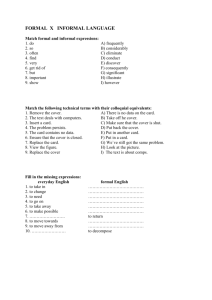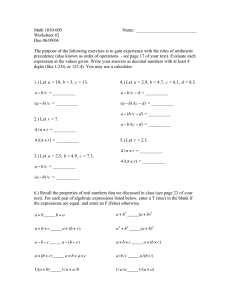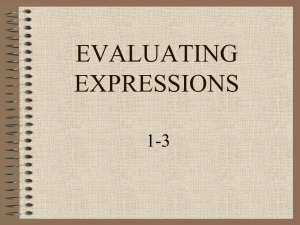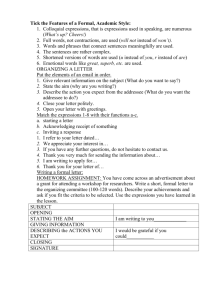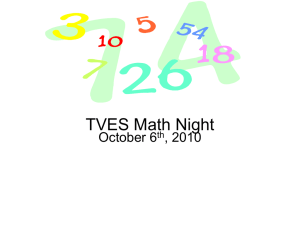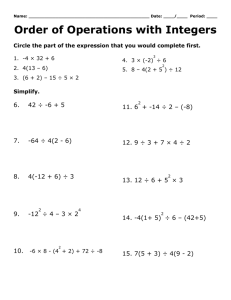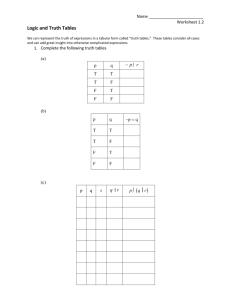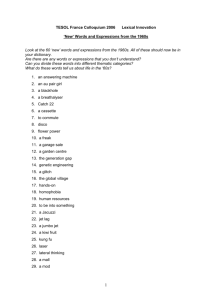11/10/2012 There's a whole range of English
advertisement
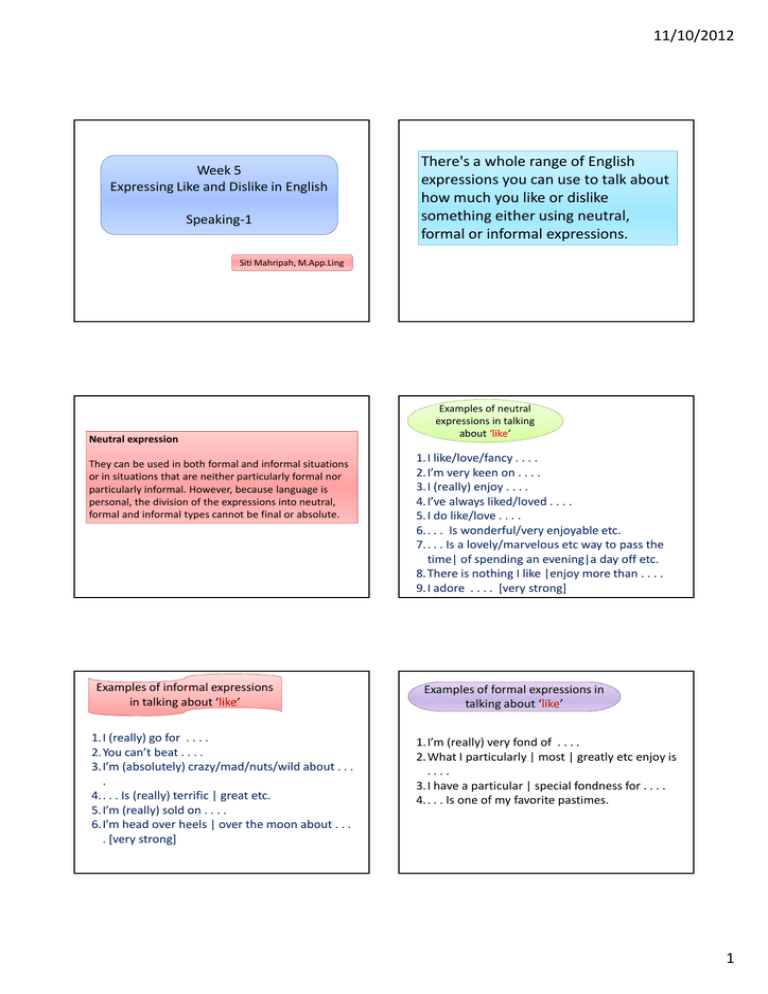
11/10/2012 Week 5 Expressing Like and Dislike in English Speaking-1 There's a whole range of English expressions you can use to talk about how much you like or dislike something either using neutral, formal or informal expressions. Siti Mahripah, M.App.Ling Neutral expression They can be used in both formal and informal situations or in situations that are neither particularly formal nor particularly informal. However, because language is personal, the division of the expressions into neutral, formal and informal types cannot be final or absolute. Examples of informal expressions in talking about ‘like’ 1.I (really) go for . . . . 2.You can’t beat . . . . 3.I’m (absolutely) crazy/mad/nuts/wild about . . . . 4.. . . Is (really) terrific | great etc. 5.I’m (really) sold on . . . . 6.I’m head over heels | over the moon about . . . . [very strong] Examples of neutral expressions in talking about ‘like’ 1.I like/love/fancy . . . . 2.I’m very keen on . . . . 3.I (really) enjoy . . . . 4.I’ve always liked/loved . . . . 5.I do like/love . . . . 6.. . . Is wonderful/very enjoyable etc. 7.. . . Is a lovely/marvelous etc way to pass the time| of spending an evening|a day off etc. 8.There is nothing I like |enjoy more than . . . . 9.I adore . . . . [very strong] Examples of formal expressions in talking about ‘like’ 1.I’m (really) very fond of . . . . 2.What I particularly | most | greatly etc enjoy is .... 3.I have a particular | special fondness for . . . . 4.. . . Is one of my favorite pastimes. 1 11/10/2012 Examples of neutral expressions Expressing Dislikes Examples of informal expressions 1. Oh, I can’t stick . . . . 2. I can’t bear . . . . 3. I can’t stand . . . . 4. I’m fed up with | tired of | sick of . . . . 5. . . . Is ghastly | rubbish. 6. Oh no! | Oh God! | Oh hell! |Oh ,how awful! 7. I never could put up with . . . . 8. . . . really bugs me. 9. . . . makes me mad / angry. 10. . . . drives me crazy. 11. . . . (really) annoys me 1.(I’m afraid) I don’t like . . . . 2.I’ve never liked . . ., (I’m afraid). 3.. . . Is not one of my favorite . . . . 4.I (really) hate . . . . 5.I think . . . Is pretty awfully | really unpleasant etc. 6.I’m not (really) very keen on . . . . 7.I can’t work up any enthusiasm for . . . . 8.There’s nothing I like less than . . . . 9.I find it difficult to get on with . . . . Examples of formal expressions 1. Oh dear, I can’t say . . . appeals to me very much. 2. I have to admit I rather dislike . . . . 3. I must say I’m not too | particularly fond of . . . . 4. I especially dislike . . . . 5. I have a particular dislike of . . . . 6. I have a particular aversion to . . . . 7. I’m not over-enthusiastic about . . . . 8. I don’t think . . . Is particularly (really) very pleasant | enjoyable. 9. I find . . . Particularly | distinctly etc unpleasant | unattractive etc. Classroom task (15 minutes). Any questions? Work in group of four/five students. Using variety types of like and dislikes expressions discussed above, interview your friends to get information on some aspects listed in the card beneath. When you’ve done with the interview, each of you present a report on each aspect to the class. 2 11/10/2012 Name 1. 2. 3 Kinds of food you don’t like. Give reasons. Types of friends you like. Give justification . Classes you don’t like. Supply with evidences. Activities you like to do in your spare time. Profession you like to be in the future. Give reasons Impromptu speaking and free discussion with random topics 4. 5. 3
